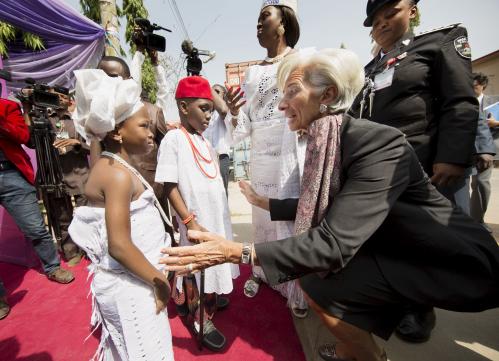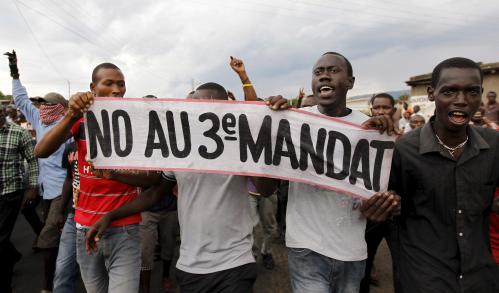Debate over fuel subsidies escalates amid fiscal troubles for Nigeria
Nigerian Finance Minister Ngozi Okonjo-Iweala acknowledged the severity of Nigeria’s cash crunch, as some public workers have not received pay in over a month—a situation she blamed on the state governments rather than the federal government. The country has experienced an over 50 percent drop in gross federally collectible revenue in the first quarter this year due to low oil prices and depressed oil revenues. One of the world’s largest oil-producing economies, Nigeria relies on crude oil for over 70 percent of its government revenue. As a result, Nigeria has been forced to frontload borrowing and has already spent 50 percent of its planned borrowings for the year. The drop in government revenues from the oil sector also prompted a cut in fuel subsidies. Although low oil prices typically provide an opportunity to remove subsidies at a reduced political cost, fears of an aggravated fuel crisis loom. Nigeria’s House of Representatives, however, voted against the motion on fuel scarcity arguing that the crisis between the market and the government had already been resolved.
For more information on the implications of oil prices and fuel subsidies in Nigeria, please refer to Africa Growth Initiative (AGI) Director Amadou Sy’s piece, Falling Oil Prices and the Consequences for Sub-Saharan Africa, as well as the 2012 post (when the Nigerian government last attempted to unsuccessfully remove fuel subsidies) by AGI Nonresident Senior Fellow Vera Songwe and former Research Analyst Nelipher Moyo on the issue, Removal of Fuel Subsidies in Nigeria: An Economic Necessity and a Political Dilemma.
Protests intensify as Burundi’s constitutional court approves President Nkurunziza’s bid for third term
This week saw the intensification of protests in Burundi against President Pierre Nkurunziza’s third bid for the presidency. On Tuesday, Burundi’s constitutional court approved President Nkurunziza’s eligibility to run for president. However, the vice president of Burundi’s constitutional court, Judge Sylvere Nimpagaritse, stated that many of the court’s judges felt the bid was unconstitutional but were subject to “enormous pressure and even death threats,” which led Judge Nimpagaritse to flee to Rwanda. Opposition leaders deemed the court’s ruling “unconstitutional” and vowed to continue their protests until the president retracts his candidacy.
As clashes between civilians and the police continue, journalists in Burundi report that officers have run out of tear gas and have started using live ammunition. Currently, the death toll stands at 11 people, including soldiers, police officers, and civilians. On Thursday, the African Union issued a warning to Burundi, stating the current political and security environment is not conducive to holding the national elections in June. United Nations estimates report that, due to pre-election intimidation, 40,000 Burundians have already sought refuge in neighboring countries. Amid the intensifying protests, President Nkurunziza stated that if he wins the upcoming elections, he will not run for a fourth term.
Gayle Smith is nominated to be next administrator of USAID
President Obama nominated National Security Council Senior Director Gayle Smith as the next administrator of the U.S. Agency for International Development (USAID) on Thursday of last week. Ms. Smith is widely known for her work in Africa, which includes stints as a journalist, civil society leader, and senior official in the Clinton administration. If confirmed by the Senate, Ms. Smith will take the reins of USAID at a pivotal moment, with the international community identifying both a successor arrangement for the Millennium Development Goals and a new means of funding poverty reduction targets as part of this summer’s Third International Conference on Financing for Development. Ms. Smith’s nomination, however, has not come without controversy. In particular, several critics point to what they perceive to be her wavering support for democratic freedoms in Africa and her “excessively friendly relationships” with autocratic governments—such as Ethiopia’s current leadership, which stands as a top recipient of U.S. international development funding in Africa, but has also imprisoned journalists and members of the political opposition. Despite these criticisms, the White House describes Ms. Smith’s current portfolio on the National Security Council as including responsibility for “global development, democracy, and humanitarian assistance issues.
On East Africa trip, Secretary Kerry makes unplanned stop in Somalia
From May 3-6, U.S. Secretary of State John Kerry traveled to Kenya, Somalia, and Djibouti, where he met with leaders in government, business, and civil society for discussions on spurring economic growth and curbing insecurity and violent extremism in the region. Notably, in Kenya, Secretary Kerry met with President Uhuru Kenyatta and pledged an additional $45 million to the U.N. in order to assist Kenya in hosting over 600,000 refugees fleeing from the conflict-affected areas of Somalia and South Sudan. In turn, President Kenyatta withdrew the government’s recent threat to close the Kenyan Dadaab refugee camp—the largest refugee camp in the world—and to expel the 350,000 Somali refugees who reside there.
On Tuesday, Secretary Kerry made an unannounced stop in Mogadishu, Somalia to discuss the country’s recent progress in combatting al-Shabab and developing political and economic institutions with President Hassan Sheikh Mohamud and Prime Minister Omar Abdirashid Ali Sharmarke. The visit has been widely cited as “historic” in the sense that Secretary Kerry is the first U.S. secretary of state to have ever visited Somalia; however, the fact that the meeting was confined to the heavily guarded airport and that Secretary Kerry gave no timeline for re-engaging the U.S. government’s diplomatic mission in Somalia emphasized the country’s still precarious security situation.






Commentary
Africa in the News: Nigerian fuel subsidies, protests in Burundi, Gayle Smith nominated USAID chief, and Secretary Kerry visits Africa
May 8, 2015